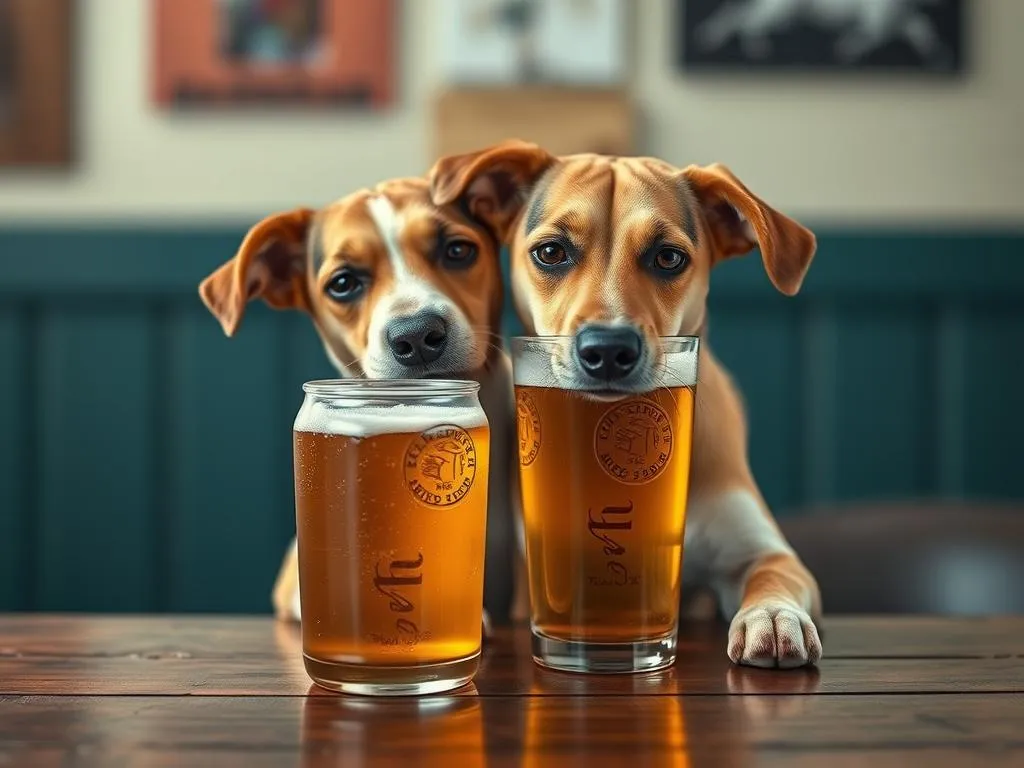
Introduction
Dog health care is a vital aspect of pet ownership that ensures our furry companions lead happy and healthy lives. One important area of focus is the dietary restrictions we must observe for our pets. While some human foods are safe for dogs, many can be harmful or even life-threatening. A common question that arises among pet owners is: can dogs drink beer? This article will delve into the implications of beer consumption for dogs and what pet owners need to know to keep their dogs safe and healthy.
Understanding Canine Physiology
Digestive System of Dogs
Dogs have a unique digestive system that differs significantly from humans. Their digestive tract is shorter, which means food passes through their system more quickly. Dogs also produce different enzymes and have distinct gut bacteria designed to break down animal proteins. While they can digest some carbohydrates, their bodies are not equipped to handle many foods that humans consume daily.
Alcohol Metabolism in Dogs
When it comes to alcohol, dogs metabolize it very differently than humans do. In humans, the liver processes alcohol through a series of enzymatic reactions. However, dogs lack some of the enzymes necessary for efficient alcohol metabolism. This difference can lead to rapid intoxication and increased toxicity levels in dogs. Even small amounts of alcohol can have severe effects, making it crucial for dog owners to be aware of what their pets consume.
Can Dogs Drink Beer?
Ingredients in Beer
Beer is made from a few simple ingredients: hops, barley, yeast, and water. While these ingredients may be harmless to humans, they can pose serious health risks to dogs.
- Hops: These can cause a condition known as malignant hyperthermia in dogs, leading to fever, rapid heart rate, and even death.
- Barley: While not toxic, it can lead to digestive upset in dogs, especially if consumed in large quantities.
- Yeast: Ingestion of yeast can cause dangerous bloating and gastrointestinal distress.
The combination of these ingredients creates a potentially hazardous mixture for dogs, making it clear that can dogs drink beer is a question with a definitive answer: no, they should not.
Effects of Beer on Dogs
The effects of beer on dogs can vary based on the amount consumed and the individual dog’s health status.
- Short-term effects: Dogs may experience intoxication similar to humans, leading to symptoms like vomiting, lethargy, uncoordinated movements, and confusion.
- Long-term effects: Chronic exposure to alcohol can lead to severe health issues, including liver damage and neurological problems.
Statistics indicate that thousands of cases of dog alcohol poisoning are reported each year, showcasing the risks associated with allowing dogs to consume beer or other alcoholic beverages.
Signs of Alcohol Poisoning in Dogs
Symptoms to Watch For
Recognizing the signs of alcohol poisoning in dogs can be crucial for timely intervention. Common symptoms include:
- Confusion and disorientation: Dogs may appear dazed or have difficulty balancing.
- Difficulty breathing: Respiratory distress can occur, necessitating immediate attention.
- Vomiting: This may be a sign of alcohol toxicity, leading to dehydration.
- Seizures: In severe cases, seizures can occur, reflecting significant neurological distress.
The severity of symptoms typically correlates to the quantity of alcohol ingested, making it essential for dog owners to act quickly.
Immediate Actions to Take
If a dog has ingested beer, the first step is to contact a veterinarian. Provide them with as much information as possible, including the amount consumed and the dog’s size. While waiting for professional help, some recommended first aid measures include:
- Keep the dog calm: Reducing stress can help prevent exacerbating symptoms.
- Monitor vital signs: Keep an eye on breathing and heart rate.
- Do not induce vomiting: This can lead to further complications, especially if the dog is unconscious or having seizures.
Alternatives to Beer for Dogs
Non-Alcoholic Dog-Friendly Beverages
While can dogs drink beer is a resounding no, there are plenty of safe and enjoyable alternatives available. Non-alcoholic dog-friendly beverages, such as specially formulated dog beers and bone broth, provide hydration without the risks associated with alcohol.
- Dog beers: These non-alcoholic options are made with ingredients like meat broth and malted barley, designed specifically for canine consumption.
- Bone broth: Packed with nutrients, bone broth is not only safe for dogs but can also be beneficial for their joints and overall health.
Homemade Recipes for Dog Treats and Drinks
Creating dog-friendly drinks at home can be a fun and rewarding experience. Here are a couple of simple recipes:
- Frozen Fruit Pops: Blend together dog-safe fruits like bananas and blueberries with yogurt and freeze.
- Chicken Broth Ice Cubes: Freeze low-sodium chicken broth in ice cube trays for a tasty treat on hot days.
These drinks not only keep dogs hydrated but also add nutritional value to their diet.
Promoting Overall Canine Health
Balanced Diet for Dogs
A well-balanced diet is essential for maintaining a dog’s health. This encompasses a variety of nutrients, including proteins, carbohydrates, fats, vitamins, and minerals. Some key foods that are beneficial for dogs include:
- Lean meats: Chicken, turkey, and beef provide essential proteins.
- Vegetables: Carrots, peas, and green beans can add fiber and vitamins.
- Whole grains: Brown rice and oats offer digestible carbohydrates.
Regular Veterinary Check-Ups
Routine veterinary visits are crucial for monitoring a dog’s health. Regular check-ups can help catch potential issues before they become serious.
- Vaccinations: Keeping up with vaccinations protects dogs from various diseases.
- Dental care: Regular dental cleanings can prevent oral health issues, which can impact overall well-being.
- Preventive measures: Discussing flea, tick, and heartworm prevention with your vet can help keep your dog safe from parasites.
Exercise and Mental Stimulation
Physical activity is critical for a dog’s health and happiness. Regular exercise helps maintain a healthy weight and provides mental stimulation to prevent boredom. Here are some ideas for engaging activities:
- Daily walks: Aim for at least 30 minutes of walking each day.
- Interactive toys: Puzzle toys can keep dogs mentally engaged while challenging them.
- Socialization: Regular playdates with other dogs can enhance social skills and provide much-needed interaction.
Conclusion
In conclusion, the question of whether can dogs drink beer is one that underscores the importance of understanding canine health and dietary needs. The dangers of alcohol consumption in dogs cannot be overstated, and responsible pet ownership involves being aware of what can harm our furry friends. By prioritizing safe alternatives and promoting a healthy lifestyle, we can ensure our dogs lead long, happy, and healthy lives. Always remember to keep harmful substances out of reach and to consult your veterinarian with any concerns regarding your dog’s health.









